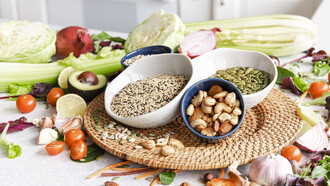It's good when food tastes good, it's kind of like proof you're alive.
(Haruki Murakami, Norwegian Wood)
Perhaps, next to sushi, sukiyaki and shabu-shabu, ramen is one of the gastronomic delicacies in Japan widely loved by all Japanese and foreigners. Although this popular noodle dish was introduced to Japan from China in the 1600s, Japanese ramen is concocted by its own method of making the dough flat, and cutting it into long, thin noodle-like strands, as opposed to the original Chinese lamian of hand-pulling the wheat dough. The first ramen shop in Japan opened in 1910 in Asakusa, Tokyo, which was run by twelve Cantonese cooks from Chinatown in Yokohama. Today, almost every region throughout Japan boasts its own ramen flavor, from soy sauce, miso, pork and chicken broth, to exotic soups, such as shrimp, crab, and yuzu (Asian citrus fruit resembling a lemon).
Contrasting conventional ramen savors, Vegan Ramen UZU Tokyo delights noodle lovers with unique recipes soaked in vegetables, edible flowers, green tea, and other natural ingredients. Above all, the captivating artwork space features cutting-edge digital art created by teamLab. TeamLab is an international art collective and interdisciplinary group of artists, programmers, engineers, CG animators, mathematicians, architects, and other specialists that have been navigating the intersection of art, science, technology, and the natural world through their artworks since 2001. It aims to explore the relationship between the self and the world and new perceptions through art, and transcend boundaries in our perception of the world. One of the ways they do this is by allowing our senses of behavior and movement to interact freely with the world around us through vision, color, light, motion, sound and texture—all within the continuity of time. Dynamic teamLab installations have travelled across the globe to New York, San Francisco, Vancouver, London, Paris, Helsinki, Istanbul, Sydney, Beijing, Singapore and other cities.
In March 2020, Vegan Ramen UZU opened in Kyoto, surprising visitors with a combination of teamLab's artwork Reversible Rotation and the unique mouth-watering taste of its vegan dishes. A polished black table is placed around the artwork, allowing customers to enjoy vegan food while being surrounded by art not just on the walls, but also on the table. Owned by visionary chef Ryo Kataoka, the “soul food” establishment joined the Michelin Guide Kyoto 2022. The Kyoto menu includes Soy Sauce Vegan Ramen, Miso Vegan Ramen, Green Tea Vegan Ramen (all three also available in the Tokyo venue), Hana-Sansho Spicy Miso Tsukemen, Vegan Pressed Sushi, and moss ice cream as dessert.
The Tokyo counterpart was launched in autumn of 2021 at teamLab Planets in Toyosu. As the rotating art is reflected on the walls, ceiling, floor and table, the concept was envisioned to allow people to ponder on the essence of eating and living. Guests can find themselves mesmerized by the unified layers of art, sound and cuisine through the Reversible Rotation-Non-Objective Space, Table of Sky and Fire, and the One Stroke Bench artwork spaces.
The Reversible Rotation-Non-Objective Space presents Spatial Calligraphy, which reconstructs calligraphy in a three-dimensional space to express the depth, speed and power of the brush strokes. The calligraphy work is flattened using what teamLab calls Ultrasubjective Space, and shifts between two and three dimensions. Having experienced this astounding presence of enormous brush strokes circulating around the room like undulating waves, while being caught in the vibration of meditative music, I felt somehow elevated to a higher degree of appreciating the special meal.
The Table of Sky and Fire and One Stroke Bench artwork spaces are located outside the Vegan Ramen UZU building. In the Table of Sky and Fire, guests can visualize the reflection of the sky and the Universe of Fire Particles Falling from the Sky artwork on the table. This artwork displays digitally generated flames in a tall column, amplifying the senses of what lies between phenomenon and substance.
One Stroke Bench resembles a continuously flowing brush stroke overlapping planes and curved surfaces, which can function for sitting, eating, playing or lounging.
The Tokyo venue’s exclusive dishes consist of cold Flower Vegan Ramen and spicy Fire Vegan Ramen. I immensely enjoyed the former, which evokes teamLab Planets Floating Flower Garden: Flowers and I are of the Same Root, the Garden and I are One art space. The presentation of edible bright flowers and leafy vegetables is utterly charming. The wheat used for the hand-made medium-thick noodles comes from Hokkaido, and shines with a silky texture. The whole wheat flour is brought in from the organic farming town of Aya in Miyazaki Prefecture. Slurping the noodles and the soup, one absorbs a healthy aroma of sweetness and acidity. The spicy Miso Vegan Ramen, on the other hand, filters a very strong fragrance of blended miso, chili bean sauce, and white sesame paste combined with seasoning oil. All the ramen dishes are saturated in a soup base of Rausu kelp, Japanese shiitake mushrooms, and vegetables, producing an exhilarating and refreshing taste. For dessert, vegan ice cream is offered in sumptuous flavors: pistachio green tea, pink rhubarb, mint cucumber and caramel coconuts. Special wine, juices, and an array of tea varieties are also available. At the flower shop at the entrance, guests can take home orchids that were used in the Floating Flower Garden: Flowers and I are of the Same Root, the Garden and I are One artwork space.
Vegan Ramen UZU is absolutely a one-of-a-kind dining experience that whets your palate for revitalizing and stimulating sensations found in nature and art.















